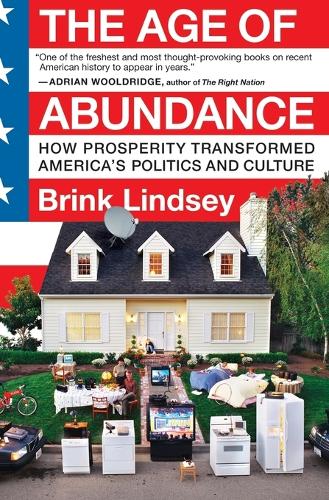
The Age of Abundance: How Prosperity Transformed America's Politics and Culture
(Paperback)
Publishing Details
The Age of Abundance: How Prosperity Transformed America's Politics and Culture
By (Author) Brink Lindsey
HarperCollins Publishers Inc
Harper Business
1st August 2008
United States
Classifications
General
Non Fiction
306.3
Physical Properties
Paperback
400
Width 135mm, Height 203mm, Spine 23mm
308g
Description
Until the 1950s, the struggle to feed, clothe, and employ the nation drove most of American political life. From slavery to the New Deal, political parties organized around economic interests and engaged in fervent debate over the best allocation of agonizingly scarce resources. But with the explosion of the nation's economy in the years after World War II, a new set of needs began to emerge-a search for meaning and self-expression on one side, and a quest for stability and a return to traditional values on the other. In The Age of Abundance, Brink Lindsey offers a bold reinterpretation of the latter half of the twentieth century. In this sweeping history of postwar America, the tumult of racial and gender politics, the rise of the counterculture, and the conservative revolution of the 1980s and 1990s are portrayed in an entirely new light. Readers will learn how and why the contemporary ideologies of left and right emerged in response to the novel challenges of mass prosperity. The political ideas that created the culture wars, however, have now grown obsolete. As the Washington Post aptly summarized Lindsey's take on the contradictions of American politics, "Republicans want to go home to the United States of the 1950s while Democrats want to work there." Struggling to replace today's stale conflicts is a new consensus that mixes the social freedom of the left with the economic freedom of the right into a potentially powerful ethos of libertarianism. The Age of Abundance reveals the secret formula of this remarkable alchemy. The book is a breathtaking reevaluation of our recent past-and will change the way we think about the future.
Reviews
"Here is one of the freshest and most thought-provoking books on recent American history to appear in years." -- Adrian Wooldridge, co-author of The Right Nation: Conservative Power in America "Shows us how great an achievement our economy is-it reshaped our society and our culture, for better and worse." -- Michael Barone, Senior Writer, U.S. News & World Report and co-author, The Almanac of American Politics "In The Age of Abundance, Brink Lindsey provides an admirable-and much needed-model of rational, respectful, readable political argument." -- Virginia Postrel, Author, The Substance of Style "In an age of abundance, the libertarian moment may have arrived, trumping the old division between left and right." -- Douglas S. Massey, Henry G. Bryant Professor of Sociology and Public Affairs, Princeton University and author of Return of the "L" Word: A Liberal Vision for the New Century "With breathtaking analysis, Lindsey...offers a dizzying look...over American economics, politics, and culture to examine the complexities of abundance." -- Booklist (starred review) "An engaging argument that, probably better than any other, explains much of how we've arrived at our current past." -- Fred Siegel, The City Journal "A wise, revealing book combining the long sweep of history with a documentarian's eye for detail." -- Chris Tucker, Dallas Morning News "Lindsey's basic argument is fresh and provocative and his insights are frequently dazzling." -- Los Angeles Times "Lindsey's measured cheerfulness is, like his scintillating book, reasonable." -- George F. Will, New York Times Book Review
Author Bio
Brink Lindsey is a senior fellow at the Cato Institute and the director of its Center for Trade Policy Studies. Under Lindseys direction, the center has become a leading voice for free trade and open markets.Lindsey has written and spoken widely on international economic issues. He is the author of Against the Dead Hand: The Uncertain Struggle for Global Capitalism (John Wiley & Sons, 2002). In addition to his numerous publications for the Cato Institute, he is a contributing editor of Reason, and his articles have appeared in the Wall Street Journal, Financial Times, The New Republic, National Review, Weekly Standard, and elsewhere.
